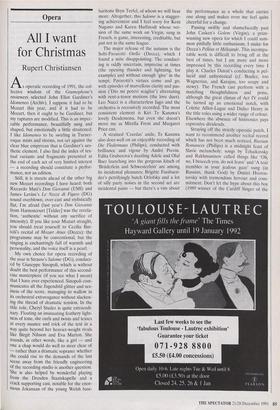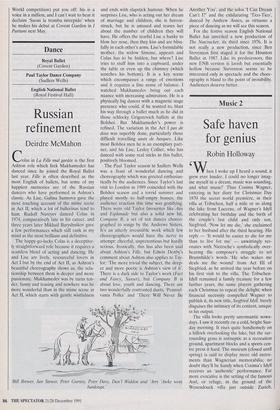Opera
All I want
for Christmas
Rupert Christiansen
As operatic recording of 1991, the col- lective wisdom of the Gramophone's reviewers selected John Eliot Gardiner's Idomeneo (Archiv). I suppose it had to be Mozart this year, and if it had to be Mozart, then it ought to be Gardiner, but my raptures are modified. This is an impec- cable performance, beautifully sung and shaped, but emotionally a little straitened: I like Idomeneo to be swirling in Turner- esque mists and storms, not set against the clear blue empyrean that is Gardiner's aes- thetic element. I also find the index of tex- tual variants and fragments presented at the end of each act of very limited interest — a recording should constitute a perfor- mance, not an edition.
Still, it is streets ahead of the other big new Mozart recordings I have heard: both Riccardo Muti's Don Giovanni (EMI) and James Levine's Le Nozze di Figaro (DG) sound overblown, over-cast and stylistically flat, I'm afraid (last year's Don Giovanni from Harnoncourt [Teldec] was the revela- tion, 'authentic' without any sacrifice of intensity). If you like your Mozart straight, you should treat yourself to Cecilia Bar- toli's recital of Mozart Arias (Decca): the programme may be conventional, but the singing is enchantingly full of warmth and personality, and the voice itself is a pearl.
My own choice for opera recording of the year is Strauss's Salome (DG), conduct- ed by Giuseppe Sinopoli, which is without doubt the best performance of this second- rate masterpiece (if you see what I mean) that I have ever experienced. Sinopoli com- municates all the Jugendstil glitter and sex- iness of the score, managing to wallow in its orchestral extravagance without slacken- ing the thread of dramatic tension. In the title role, Cheryl Studer is quite extraordi- nary. Floating an insinuating feathery light- ness of tone, she curls and twists and teases at every nuance and trick of the text in a way quite beyond her heavier-weight rivals like Birgit Nilsson and Eva Marton. She sounds, in other words, like a girl — and one a chap would do well to steer clear of --- rather than a dramatic soprano: whether she could rise to the demands of the last scene away from the friendly engineering of the recording studio is another question. She is also helped by wonderful playing from the Dresden Staatskapelle and a crack supporting cast, notable for the enor- mous Jokanaan of the young Welsh bass- baritone Bryn Terfel, of whom we will hear more. Altogether, this Salome is a stagger- ing achievement and I feel sorry for Kent Nagano and Karen Huffstodt whose ver- sion of the same work on Virgin, sung in French, is game, interesting, creditable, but just not in the same league.
The major release of the autumn is the Solti-Pavarotti Otello (Decca), which I found a mite disappointing. The conduct- ing is oddly uncertain, imprecise at times (the opening thunder and lightning, for example) and without enough 'give' in the tempi; Pavarotti's virtues come and go, with episodes of marvellous clarity and pas- sion (`Dio mi potevi scagliar') alternating with rent-a-tenor motions (the love duet). Leo Nucci is a characterless Iago and the orchestra is recessively recorded. The most consistent element is Kiri Te Kanawa's lovely Desdemona, but even she doesn't move me as Mirella Freni and Margaret Price can.
A strained 'Czardas' aside, Te Kanawa also does well on an enjoyable recording of Die Fledermaus (Philips), conducted with brilliance and vigour by Andre Previn. Edita Gruherova's dazzling Adele and Olaf Baer launching into the gorgeous kitsch of `Briiderlein and Schwesterlein' are among its incidental pleasures; Brigitte Fassbaen- der's petrifyingly butch Orlofsky and a lot of silly party noises in the second act are incidental pains — but there's a vim about
the performance as a whole that carries one along and makes even me feel quite cheerful for a change.
Passing swiftly and shamefacedly past John Casken's Golem (Virgin), a prize- winning new opera for which I could sum- mon pitifully little enthusiasm, I make for Decca's Pelleas et Melisande. This incompa- rable work is difficult to bring off at the best of times, but I am more and more impressed by this recording every time I play it. Charles Dutoit's conducting is pel- lucid and unhysterical (cf. Boulez, too Wagnerian, and Karajan, too soupy and stewy). The French cast perform with a matching thoughtfulness and poise, although the great climax of Act IV could be turned up an emotional notch, with Colette Alliot-Lugaz and Didicr Henry in the title roles using a wider range of colour. Elsewhere the absence of histrionics pays expressive dividends.
Straying off the strictly operatic patch, I want to recommend another recital record which has not been much noticed. Russian Romances (Philips) is a midnight feast of Slavic melancholy: songs by Tchaikovsky and Rakhmaninov called things like 'Oh, no, I beseech you, do not leave' and 'A tear trembles in your jealous gaze' sung (in Russian, thank God) by Dmitri Hvoros- tovsky with tremendous fervour and com- mitment. Don't let the hype about this boy (1989 winner of the Cardiff Singer of the
World competition) put you off: his is a voice in a million, and I can't wait to hear it declaim `Suoni la tromba intrepido' when he makes his debut at Covent Garden in I Puritani next May.











































































































 Previous page
Previous page